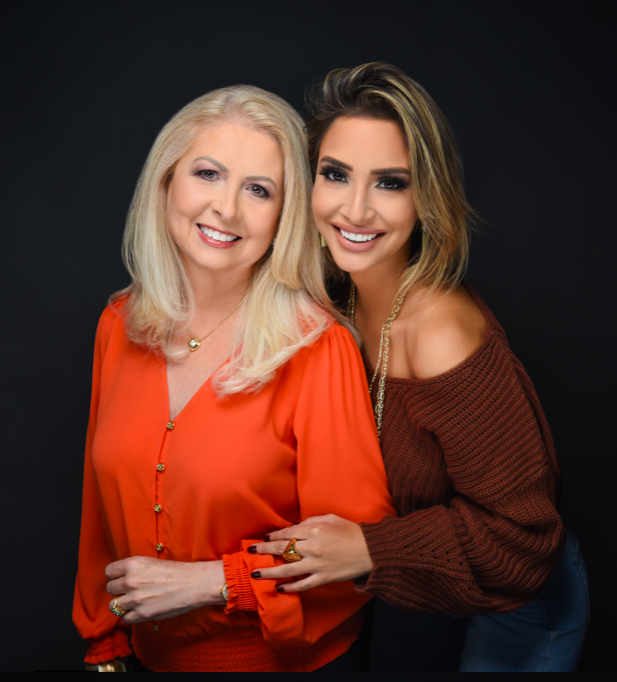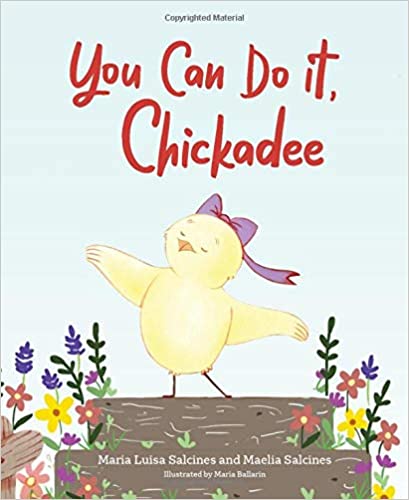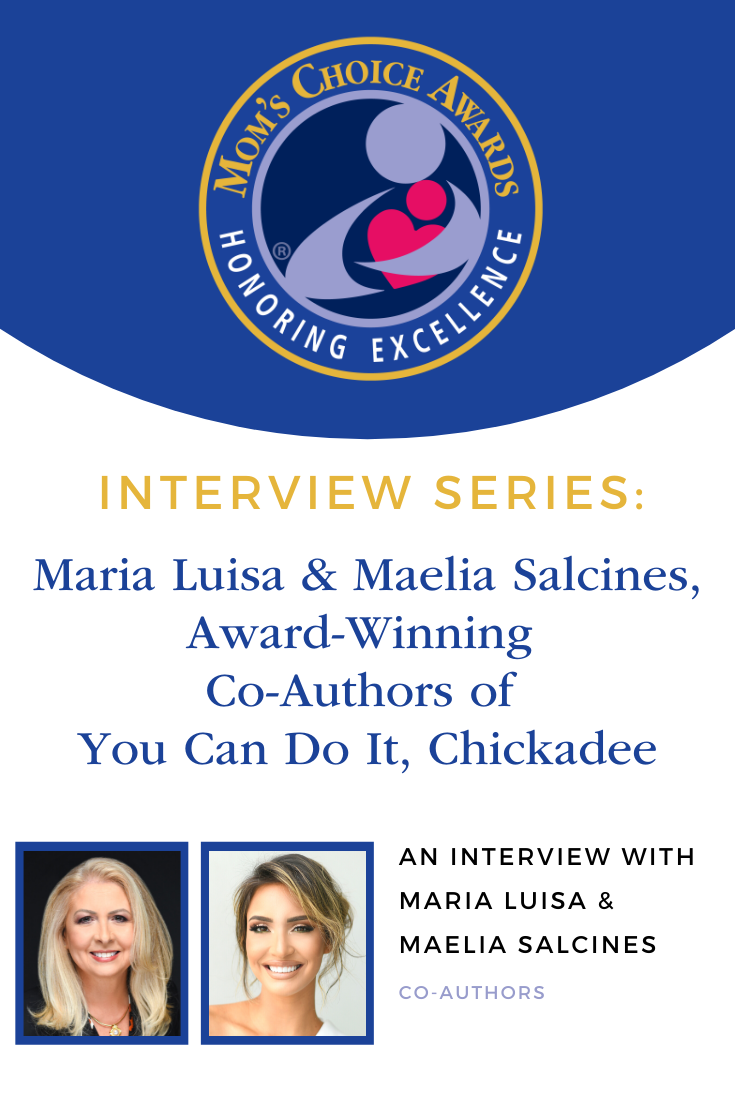Mom’s Choice Awards is excited to announce another post in our interview series where we chat with the inventors, designers, publishers, and others behind some of our favorite family-friendly products.
Hello, Mom’s Choice readers! Thank you all for joining us for another installment in our interview series. Today we had the pleasure of speaking with two of our honorees, Maria Luisa and Maelia Salcines. Maria Luisa and Maelia Salcines are not just mother and daughter, but also co-authors of the MCA award-winning book, You Can Do it, Chickadee. You Can Do it, Chickadee uses vivid, person-centered, age-appropriate language to describe the physical and emotional challenges brought on by depression. You Can Do it, Chickadee is a sweet story that gives a deeper level to understanding mental health in young children. This book is also filled with beautiful illustrations and is a must-read for any parent or educator to read to their children during this time of such uncertainty. Keep reading to find out more about Maria Luisa and Maelia and their award-winning book, You Can Do it, Chickadee.
MCA: Hi Maria Luisa and Maelia! Thank you for sitting down with us for this interview today. It’s always such a special treat for us at MCA when we get to see a mother and daughter writing duo! Mental health is such an important topic, especially with everything that has happened in the past year and a half. Let’s start the interview by finding out a little bit about the two of you!

Mother & Daughter & Co-Authors of You Can Do it, Chickadee, Maria Luisa and Maelia Salcines
Maria Luisa: I was born in Guantánamo, Cuba, and emigrated to the United States with my parents and younger brother in 1963. I met my husband, who also emigrated from Cuba when his family moved to McAllen. We have been happily married for 43 years and have three adult children, two sons, a daughter, and four grandsons.
I recently retired after 27 years of writing a weekly family column for The Monitor Newspaper in South Texas. I am the author of Little Things Remembered, a collection of moving observations on love, parenting, and cultural identity. And the co-author of Maggie’s Visit to the Playroom, Play Time for Molly, Matt’s in Trouble Again, and Matt Otra Vez en Problemas. These children’s books are on play therapy, filial therapy, and school counseling. My work has appeared in Chicken Soup for the Latino Soul, where three of my stories were published, and Chicken Soup for Mom’s Know Best collection of their 101 Best Stories. My essay on the Cuban immigrant experience appeared in The Cuban American Family Album and pictures of her family. It was an honor to be included in this book written by Thomas and Dorothy Hoobler and published by Oxford Press. I am a contributing columnist for The Merrimack Parent and I write about family life on my blog FamilyLifeAndFindingHappy.com.
However, the book I am most excited about is my recent children’s book that I co-wrote with my daughter. You Can Do It, Chickadee is more than just a children’s book about depression. It is a book born from my daughter and I’s experience when Maelia was struggling with depression. It is a book about the love between mother and daughter and how together they navigate depression. My daughter and I are now working on their second book and are planning a series of You Can Do It children’s books.
I am also a certified Instructor Trainer, Parent Educator, and Parent Coach with The Academy of Parenting Education and Coaching in Redirecting Children’s Behavior and Redirecting for a Cooperative Classroom. I believe parenthood is the most rewarding and the most challenging job a person can have. I am a frequent guest speaker in schools and community organizations. As a Cuban-American, I am grateful for the opportunities this country has given my family. My writing always conveys a message of hope, optimism, and the importance of family.
I love to cook, needlepoint, and spend time with my husband at our ranch in South Texas. Our ranch Puerto Escondido (Hidden Port), is named after the ranch my paternal grandfather had in Guantánamo, Cuba. Our family lost this ranch and all of our properties when the communist government seized it.
Maelia: I was born in Paraguay and adopted by my parents when I was an infant. I have an associate degree in Early Elementary Education from South Texas College. I am a makeup artist with Team Flawless and a social media content developer. I was Miss Rio Grande Valley USA 2019, Miss Texas USA People’s Choice Award 2019, and Miss Heart of Texas USA 2020.
In 2019, I decided to step out of my comfort zone and enter my first pageant, and won. During my on-stage question, when I was asked what I felt my greatest accomplishment was, I decided to open up publicly about my anxiety and depression. Up to this point, no one but my family and very close friends knew. Speaking publically about my struggles was the first step toward accepting what I had experienced as a gift. That night, I realized that my purpose was to share my mental health journey to help others. The overflow of “Me Too” responses prompted my best friend and me to start our non-profit Mental Monarchs, which is dedicated to providing psychoeducation and awareness to help end the stigma associated with mental illness.
I love photography and spends my spare time gardening and knitting. I also love animals and have a Chihuahua named Mila, a Yorkie named Gypsy, two geckos, and a bearded dragon. My gecko Tex will be the main character of the next You Can Do it book I am also co-writing with my mother.
MCA: You are both very accomplished! Mental health can be such an incredibly difficult thing to talk about, especially publicly. What was your inspiration for co-writing You Can Do it, Chickadee together?
Maria Luisa: We talked about writing a children’s book for months and finally had time to do it during COVID lockdown. Maelia is Chickadee, and everything Chickadee experiences are what she went through. Watching my daughter struggle with anxiety and depression was heartbreaking. We had so many questions and not enough answers. There is a stigma associated with mental illness, and so people don’t talk about it.
We decided that introducing this subject at a young age would help normalize the conversation and help children and their parents understand what depression is.
Maelia is the youngest and only daughter. Her brothers are 13 and 15 years older. When she was a little girl, I would sometimes call her “my little chickadee.” During her depression, on days when she felt she would never feel better, I would say things like, “You can do it. It’s going to be Okay. Just take one day at a time.” Chickadee’s mom says all these things to her.
MCA: That is so important, thank you for spreading such a powerful message with this book. Speaking of this book’s important message, can you tell us how You Can Do It, Chickadee helps parents and kids understand and cope with anxiety and depression?
Maria Luisa: The book’s sweet, hopeful tone and emotionally simple language help parents, educators, and caretakers understand what children are feeling and creates an open dialogue around mental health. By reading about Chickadee, children can understand what depression feels like and how important it is to be patient and take small steps towards feeling better. Depression is not something a child can snap out of, and it takes love and encouragement from the child’s parents and caretakers to help that child understand and navigate his or her depression.
MCA: Why was it important for you to use person-centered, age-appropriate language to describe the physical and emotional challenges brought on by depression in You Can Do It, Chickadee?
Maria Luisa: It’s not easy to explain depression to a child, but by using person-centered age-appropriate language, a child will be able to relate to what Chickadee is feeling.
It’s a struggle for Chickadee to get out of bed. She has to tell herself that she can do it. She has to eat even when she’s not hungry and take her medication which is something children hate to do, but so important. When a child is depressed, a parent can encourage him or her to get up and eat, but the child also has to make an effort, and that is why Chickadee takes one step, two steps, three steps, four. We wanted to show children that it isn’t easy, and we wanted parents to see how the little steps are essential when their child is struggling.
MCA: What are some of the characteristics the main character, Chickadee, exhibits throughout the story?

You Can Do it, Chickadee Book Cover.
Maria Luisa: Chickadee is determined to make it out the door and go outside to play with her sisters.
That’s why we have her count her steps. We wanted children to understand that it isn’t easy, but you can’t give up. Resilience is a skill children need to learn to cope with when something bad happens. It’s a mode of thinking that children need to develop gradually. Chickadee shows them how to do this. There are five pillars of resilience, self-awareness, mindfulness, self-care, positive relationships, and purpose. We wanted Chickadee to exhibit these pillars to show how you can thrive even during difficult times.
First, Chickadee has to understand that she is depressed and that her anxiety sometimes makes her say mean things to her mom. She also has to learn how to take care of herself by taking her medication and going to a therapist. We also wanted children to see the relationship she has with her mom and how important it is to have someone who supports them. And the importance of having a purpose. Chickadee wanted to go outside, and having that purpose made her keep ongoing.
MCA: What is the purpose of the tips at the end of the book?
Maria Luisa: The tips at the end of the book help parents, educators and caregivers understand depression. We list some of the signs to look for and some things parents can do to help their children. As well as resources where parents and educators can turn to for more information.
MCA: If your readers could walk away with one main lesson from You Can Do It, Chickadee, what would that be?
Maria Luisa: We want our readers to know that the most important thing they can do when they are depressed is to talk about their feelings, ask for help, and be patient with themselves.
Parents, educators, and caregivers need to be supportive and do all they can to let the child know that it will be okay. You cannot rush the process. It’s about taking things one day at a time, one step at a time.
MCA: That is a great message to leave us off with, thank you to you both!
You can learn more about Maria Luisa and Maelia and their award-winning book, You Can Do It, Chickadee by visiting their MCA Shop pages.






